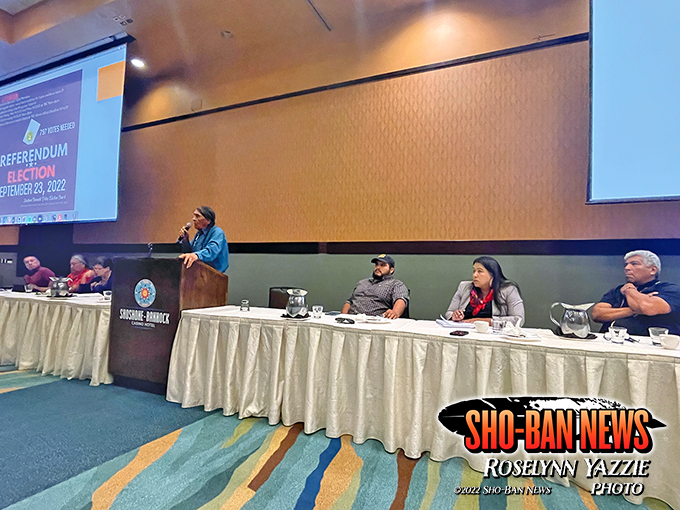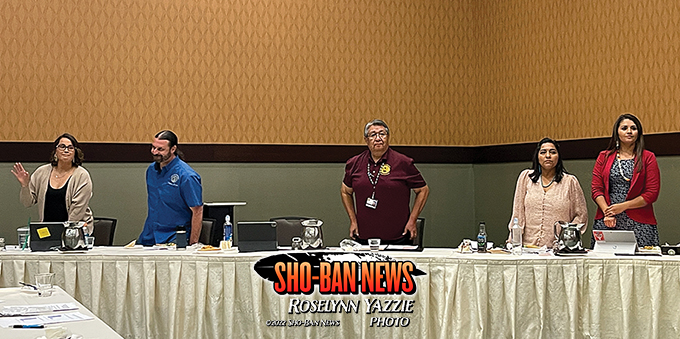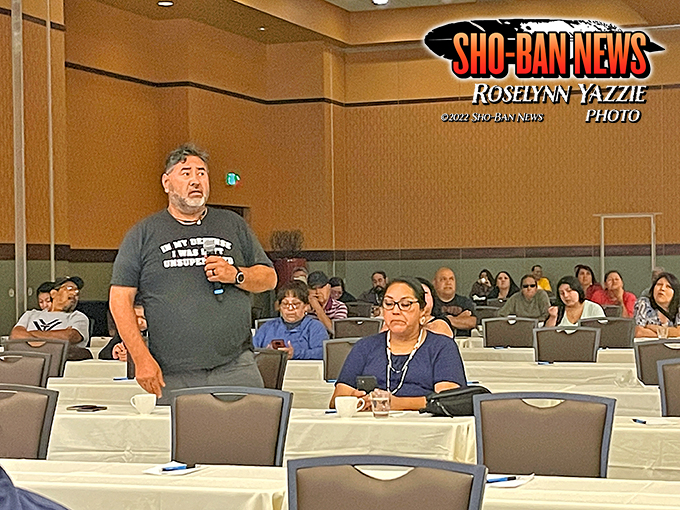Tribal members air concerns on Mountain Home Economic Development Project

Fort Hall Business Council members speak at the August 30 Reservation Wide District Meeting.
By ROSELYNN YAZZIE
Sho-Ban News
FORT HALL — The upcoming Referendum Election on September 23 was the topic of discussion at the “Reservation Wide” District Meeting on Tuesday, August 30 where the meeting focused on the proposed Mountain Home Economic Development Project featuring a new casino/hotel/resort.
The meeting was for Shoshone-Bannock tribal members to learn more about the 157 acres of land purchased by the Fort Hall Business Council in Elmore County near Mountain Home which cost $1.57 million according to the handout given at sign in.
Shoshone-Bannock Tribes Planning Director Alonzo Coby thanked the membership for their attendance and introduced the Mountain Home Project team, which included Echo Marshall, Randy’L Teton, Marvin Osborne, Travis Stone and Andi Weber.
Fort Hall Business Council (FHBC) Chairman Nathan Small explained the talks of the project have been years in the making and initially began with the Shoshone-Paiute Tribe but due to time and change in leadership they backed off the venture.
Small said he hopes the vote will pass so they can start moving forward and getting the land into trust process, which can take a few years to complete. However, he said it will benefit the future and will create more jobs, “It takes time, that’s how people become successful,” said Small.

Mountain Home Economic Development group at the meeting.
FHBC Sergeant At Arms Gaylen Edmo said since being on council he wanted to gain more perspective and information on this project and one of the things he realized once the budgets came up it was eye opening because the money does not go far when it comes to spreading it out across all departments.
“Somewhere along the line in the past decade we outgrew our government and we don't have money to keep up with it unless we build something, a money maker or we look into multiple projects to try to bring in more money,” he said.
He sees the high density population of the Mountain Home area as a benefit to the venture.
FHBC member Lee Juan Tyler spoke in favor of the referendum vote and said if it's a bad deal it won’t be approved but the Tribes have to do something to make things better.
The following information was outlined in the handout:
The land was purchased for economic developments projects in January 2020 and has since increased in value by more than 23 percent. The land is a designated grazing area with taxes paid on it in 2021 in the amount of $5,874.
The handout give to tribal members states, “The current revenue streams have been unable to keep up with the expansion of basic governmental services, rising cost of services and inflation. Along with services, many of the Reservations basic infrastructure needs repair and replacement (e.g. water & waste line, road repairs broadband development, failing office buildings, etc.)
The land sits on the aboriginal territory known as the Great Camas Prairie where historically treaties and agreements were negotiated with the United States.
FHBC is using JCJ, an architecture firm, experienced with working in Indian Country for more than 30 years.
So far, the Tribes have completed a geotechnical report and feasibility study that supports this type of large-scale development. The Tribes are also required under federal regulations to conduct a comprehensive environmental study of the land, water, air quality, etc. if the referendum vote approves the project.
Building the new casino/hotel/resort all in plan will cost $311 million according to the Market Assessment (feasibility study), which was estimated to be paid off in 2.6 years. The new proposed facility would feature a casino with 2,000 electronic gaming machines; 250 room hotel; six food and beverage venues; 15,000 square foot event venter; 12-lane bowling enter; two movie theaters; video arcade; horse racing track and grandstand; outdoor event space; proposed overall development size equals 500,000 sq. ft.
The timeline of the project was halted due to the referendum vote. Along with no real decisions on other factors like whether or not the FHBC has made the decision if it will have a new Gaming Commission or additional Gaming Commissioners to regulate at the new facility. Also being discussed but not planned thoroughly depending on the referendum decision include job relocation, employee housing, child care provided, and an on-site health care facility.
Elmore County or the State will not share in the Tribes’ gaming revenues in accordance of Section 19 of the Gaming Compact.

Bannock Creek residing tribal member Russell Haskett speaks.
The state, city and county benefit from the Mountain Home Project, according to the Economic Impact Study by The Innovation Group $187.2 million annually to local and state economies (direct and indirect) and 1,010 employees annually. Annual tax revenue will be $1.6 million in local tax revenue; $2.3 million in state tax revenue; $3.1 million in federal tax revenue. Construction will put $160.6 million into local and state economies; one time fiscal tax impacts from construction would contribute $4.4 million to local; $8.1 million to state and $21.5 million to federal.
Jurisdiction to the facility in Elmore County would include Tribes having civil regulatory jurisdiction over gaming operation. Tribes would have exclusive criminal jurisdiction over Indians. State would have exclusive criminal jurisdiction over non-Indians. Federal would have jurisdiction over major crimes and major gaming incidents.
Tribal members would receive per capita from the new gaming facility after the debt created from construction and other unmet needs of the Shoshone-Bannock Tribes are met. Notably, the project will not affect current per capita payments.
Tribal members employed at the Mountain Home facility would retain their Treaty Rights regarding hunting, fishing, etc.
The tribal members will benefit from the project by an overall increase in revenue for all governmental services, general welfare programs, education, employment opportunities and economic development.
Currently the only work being done by the Mountain Home Task Force is completing all application materials for the Fee-To-Trust application, which is being drawn up by Shoshone-Bannock attorney Jeanette Wolfley and must be submitted to the Department of the Interior.
Alcohol will be served at the property in designated areas.
The Tribal Employment Rights Ordinance will apply to hiring at the hotel along with tribal preference.
The Tribes will be able to operate under the existing Gaming Compact.
The discussion was opened up to tribal members for questions and comments.
Keith Moore asked what other projects if this plan is not voted upon in favor. Gaylen Edmo explained his view on the benefits of the recreation and medicinal marijuana industry although things like the Tribes Law and Order Code would need to be amended.
Nancy Eschief Murillo asked where the council was going to get the loan as well as what was Idaho Governor Brad Little’s thoughts. Chairman Small said the Governor said years ago he was on board as long as the city was okay with it.
Alonzo Coby answered the Tribes feasibility study supports the $311 million, he reiterated it’s an estimated amount and said the building can also be done in phases. There’s no construction contract yet until the membership approves. The loan will be done through an RFP, which is how they got the Sho-Ban Hotel Casino built through a bank, another option could be through other richer tribes who support other tribes to get into gaming. Small emphasized there is no selection yet.
Russell Haskett talked about how the membership must question the council due to bad decision after bad decision. While he sees the Tribes need to look for other avenues of revenue he feels the Mountain Home deal snuck up on the membership. Haskett said none of council had business experience and one had to look at how they ran the Tribe and how the roads were in poor condition, in addition to the Tribal Business Center building.
“This is the kind of thing we have to base our decision on supporting a big venture. You guys are telling us all the sunshine and rainbows on this deal, but if it fails who’s going to pay for these loans? The Tribes, not you guys,” he said.
Lunita Ariwite asked do they owe on the current casino in Fort Hall, which Chairman Small answered “yes.” They’re still paying for the casino and hotel. She added we need to work on our back yard before we start looking at other things because it’s embarrassing.
Marcia Hall commented it would be good to see what the feasibility study was on the current Fort Hall Casino Hotel and do a comparison to see if they’re on target or not. She said when looking at the building now there’s falling down bricks as well as lack of staff to fill positions.
Shayna Martin expressed she was in support of the project, especially due to the Boise State University initiative with the Tribes because there will be job opportunities for those tribal members that will be at BSU. Additionally with Meridian being a fast growing city she feels the Tribes need to take advantage.
Luke Eagle called for transparency from the council, which they explained what this meeting was for.
Gary Watson said the plans look good and asked why don’t we develop those here? Initially the plan of the current Fort Hall Casino Hotel was to develop more. Chairman Small answered the only time the Hotel is full is during the Festival and they have flatlined on what they can do with the current facility.
FHBC Secretary Claudia Washakie said it was good for the membership to express concerns and take part in the process.
Ellen Roy commented she felt like this was a fluff meeting and council had already made decisions.
The Referendum Election is on Friday, September 23 for Shoshone-Bannock tribal members. All eligible voters must meet the requirement of establishing residency for one year and be at least 21 years old. The voting is in person only, and voters must bring a Tribal ID.
Early voting will be on Wednesday, September 21 and Thursday, September 22 at the Tribal Business Center from 9 a.m. to 6 p.m. All district voting will be on September 23 from 9 a.m. to 8 p.m.





